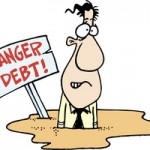Paying Off Your Debt
 Credit can be a wonderful thing. But when it gets out of hand, it can wreak havoc on your finances. This is especially true when it comes to credit cards. Charging up a large balance is bad enough, and by the time you add in fees and high interest rates, the debt can be overwhelming.
Credit can be a wonderful thing. But when it gets out of hand, it can wreak havoc on your finances. This is especially true when it comes to credit cards. Charging up a large balance is bad enough, and by the time you add in fees and high interest rates, the debt can be overwhelming.
In a perfect world, everyone would use credit wisely and pay off balances within a month or two. But in reality, cardholders often build up a mountain of debt and fail to realize it until it’s unmanageable. That’s when it’s time to put the plastic away and work on paying off the balance. Here are some tips to help you do that.
1. Rework your budget, eliminating unnecessary items. Even little things like that cup of coffee you buy on the way to work every morning can add up. Once you’ve decided what you can do without, add up how much you’ll save and add it to your monthly payment.
2. Volunteer for overtime, or get a second job. Put all the extra money you make toward your balance.
3. Reduce your overall interest rate. If you have a low interest card that allows balance transfers, transfer the balance of a higher interest card to it. Even if you can only transfer part of the balance, you will save some money and be able to pay everything off more quickly.
4. Put lump sums of money that you receive toward your credit cards. These may include tax refunds, bonuses or settlement proceeds. This can save you a lot of money in interest.
5. Put your raises toward paying down your debt. A raise is money that you were living without before, so you should be able to continue to live without it until you’ve paid off your credit cards.
6. Sell stuff. Get rid of that extra vehicle, or have a garage sale. We all have things sitting around that we could do without, and those things can make us money. Use the extra cash to help pay off your credit card debt.
7. Snowball your debt. This simply means paying the minimum payment on all but one card, and paying as much as possible toward that one until it’s paid off. Then you move on to another card, paying the minimum payment plus what you were paying toward the previous one. Repeat until all balances are paid in full.
8. Get help from friends and family. A loan from someone who is close to you can help you get out of debt, and repayment terms are usually much more favorable. But it’s still important to have a repayment agreement and follow it carefully.
9. Negotiate with your creditors. If you’re having a hard time paying off your balance, they might be willing to lower your interest rate. You may be required to stop using your card while the lower rate is in effect, but a moratorium on charging until your finances are in better shape is a good idea anyway.
10. Talk to a credit counselor. If you are several thousand dollars in debt and can’t afford your payments, credit counseling could save you from bankruptcy. A credit counselor will negotiate with creditors on your behalf, and can usually get you lower interest rates and reduced payments. Once it’s all set up, you make one monthly payment to the credit counseling agency, and they forward the appropriate amount to each creditor.
